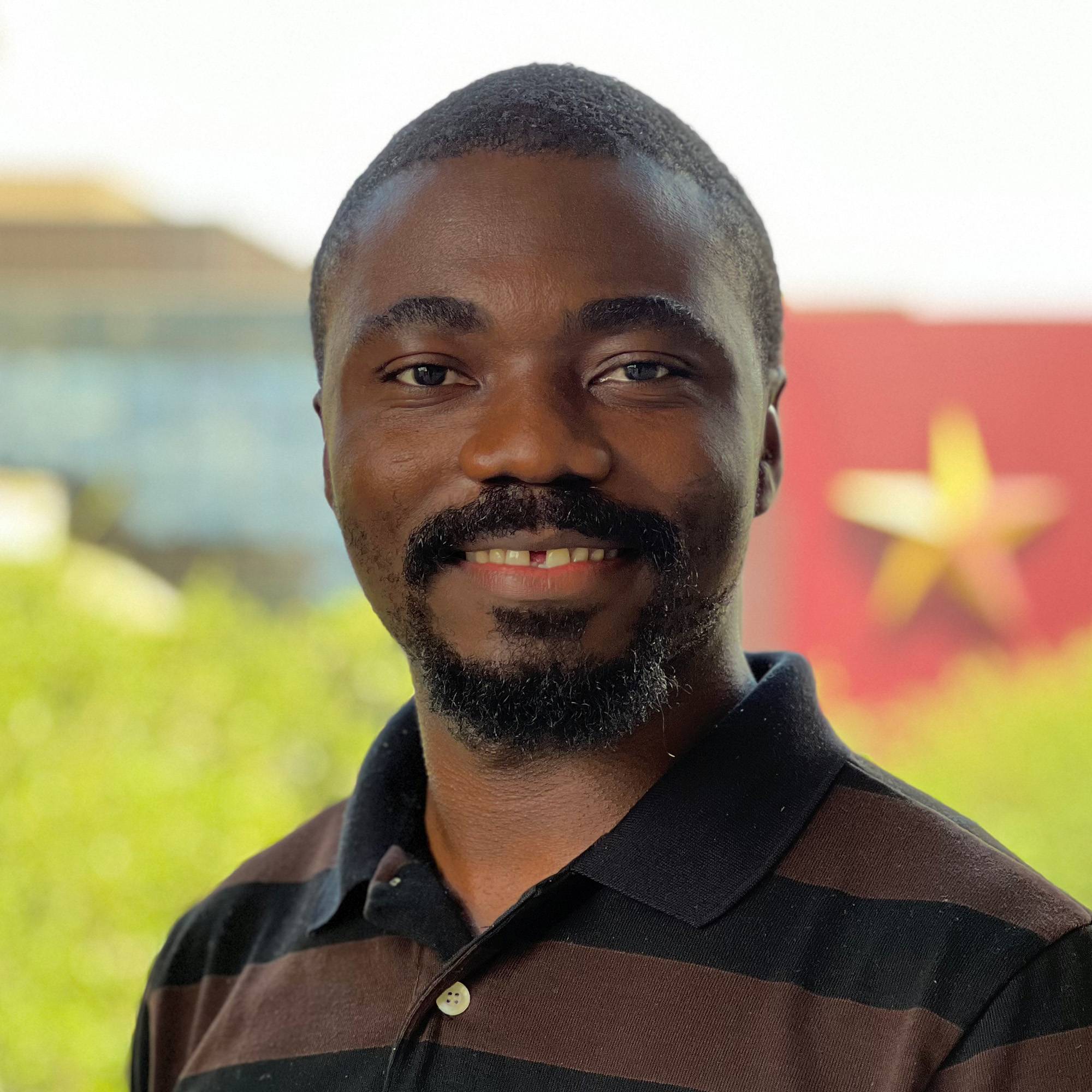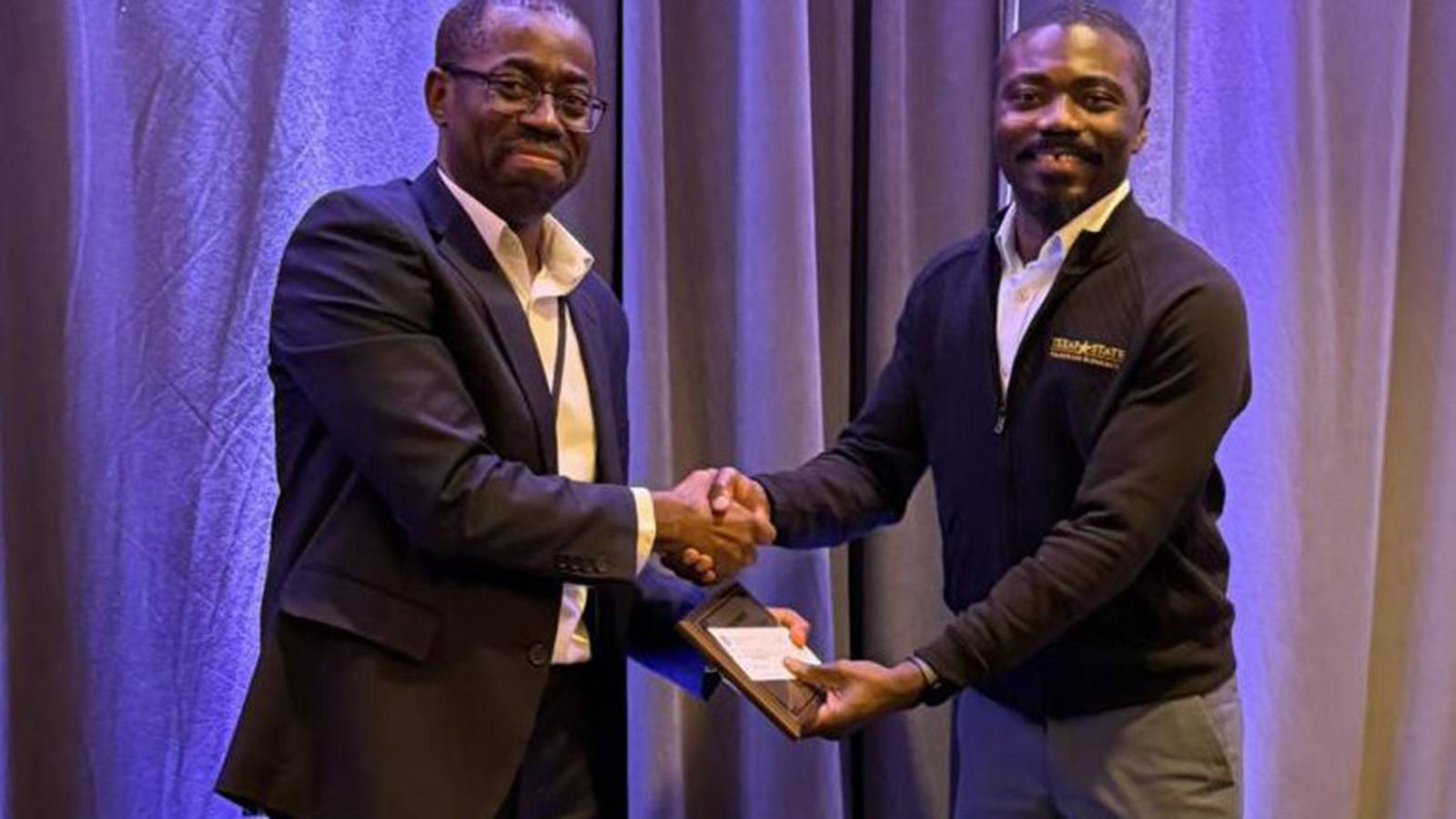TXSTMcCOY MAGAZINE

More than
numbers
Dr. Augustine Tarkom found his calling in finance
by Valerie Figueroa
T he fuel that drives Dr. Augustine Tarkom is simple: a devotion to helping others. This ambition stems from his childhood when he dreamt of being a doctor after seeing his ill mother struggle to get the medical help she needed. This innate desire to help people blossomed into an unexpected yet successful career in finance and economics.
"I didn't know anything about doctors, and I started asking questions," he says. "Why couldn't people like my mom get the kind of help they need if they are going through these difficult times? I said to myself, 'When I grow, I'm going to become somebody who takes care of the sick.'"
Today, Tarkom is an assistant professor of finance and economics at Texas State University's McCoy College of Business. He says his road to the university was fraught with challenges.
He was raised far from the U.S. in Ghana, West Africa. Like his mother, he faced financial obstacles in his early pursuit of being a medical doctor. This challenge led to his pivot not away from helping people but understanding the force that had kept his mother from medical access and him from his dream of being a doctor: finance.
"I wanted to work with people," he says. "I wanted to serve people, and if I didn't get a chance of being a medical doctor, the best way was to be a professor and understand the core reason why I couldn't achieve my [goal] so that I can at least communicate to people so they don't get into the situation that I got into."
He pursued a B.A. in economics at the University of Cape Coast, an M.S. in both data science and economics at South Dakota State University, and a Ph.D. in finance at Texas A&M International University. Despite his peers' warnings about the challenges of pursuing a degree in economics, he was headstrong in his decision to continue and excelled in the field.
Tarkom's academic pursuits were motivated by a deep curiosity in the functions of finance rooted in his own difficulties. That interest led him to explore how financial systems work at both micro and macro levels.
"The premise was I was curious," he says. "How are people managing their finances [so] they could come out of trouble when needed? I was curious and I wanted to know more. If this same phenomenon didn't allow my mom to access what she needed, didn't allow me to pursue what I wanted to, then it is something that I needed to study in depth to understand."

“How are people managing their finances [so] they could come out of trouble when needed? I was curious and I wanted to know more. If this same phenomenon didn't allow my mom to access what she needed, didn't allow me to pursue what I wanted to, then it is something that I needed to study in depth to understand.”
— Dr. Augustine Tarkom
His research often explores political and economic theory. For instance, in one study Tarkom co-authored with Dr. Matthew Flynn, also a finance and economics professor at McCoy College, he examined how political betting markets and the stock market reacted to the 2020 U.S. presidential election, specifically when a candidate has public, corporate interests.
"The finding was simple," he says. "Political events tend to predict these two markets, but the information processing speed is different. We found out that the political betting market actually processes information very fast. The moment the news hit, that information was immediately processed in the betting market, but the stock market took about 3-5 days to process this information."
In another study, for which he received the Best Paper in Investments award at the annual Southwestern Finance Association meeting, he analyzed the relationship between gender and risk perception in financial investments. In the study, he challenged recent claims suggesting that men and women now exhibit similar risk-taking behaviors. Instead, drawing on evolutionary theory and previously unexplored data, he argued that fundamental differences persist, even if there is a perceived shift in risk behavior among women.
"If we go back to the basic root, women are less likely to want to take risks," he says. "Think about a mother carrying a baby for nine good months, taking every precaution to protect her child. They are cautious. They are always making decisions that will ensure the safety of their offspring. Men, on the other hand, are more likely to engage in a more risk-taking attitude in order to gain dominance, right?"
Teachings that simulate life
In the classroom, Tarkom says that his teaching approach simulates real life. He is focused on helping students see themselves in the material he teaches. He remembers one student who was often disengaged and frustrated.
"What I mostly try to do is translate more complex theoretical arguments to [students'] level," he says. "I called [on a student] one time and I said, 'What is going on? Do you have a savings account? Do you plan on retirement? When do you plan on retiring? How much do you plan on having when you go on retirement?' After asking all these basic questions, I was like that's exactly why you are taking this class. If you want to make that decision, this is the tool you need. Ever since, her attitude changed. Breaking those complex theoretical issues down to something that they can apply [to themselves] makes me happier than anything else."
Tarkom emphasizes that his teaching method is about equipping students with the tools to successfully navigate their careers and their lives. He says that in addition to technical fluency and adaptability, soft skills like communication and ethics are foundational pillars for anyone entering the job market, finance or not.
"These are some of the skills that I expect students to have," he says. "Once you have this, I feel you are ready to go to the job market."
Research with a purpose
As a professor, Tarkom continues to boost the future workforce and keep himself occupied with his research. Tarkom and his colleagues are currently looking at how much time Americans spend managing their finances. The early findings are concerning: less than 5% of Americans devote even minimal time to budgeting or financial planning. He says he hopes to make this research more accessible and practically relevant so people can better manage their debt and finances.
"We are living in a time where household debt is increasing, and if people are not making a conscious effort to spend time managing their finances, you can't expect to get out of this debt."
Another project explores how institutional investors such as BlackRock affect companies' working capital strategies. Tarkom is also studying how households perceive climate risk in their investment decisions, which is a growing concern in an uncertain market.
From his early roots in Ghana to the halls of McCoy College, Tarkom remains focused on his purpose: helping others, both through his research and role as a professor. His dream of healing the sick may not have come to fruition, but he says there is still hope.
"I don't regret not doing it, but I still have that spirit in here. If I get a chance, I will do it one day." ✯
Dr. Augustine Tarkom
Assistant Professor of Finance & Economics
Ph.D., Texas A&M International University, 2024
M.S., South Dakota State University, 2019
B.A., University of Cape Coast, 2016
Award Highlights
- Best Paper Award in Investments, Southwestern Finance Association, 2025
- Best Discussant Award, Boca Corporate Finance and Governance, 2022
Research Interests
- Corporate Finance
- Corporate Governance
- Househould/personal finance
- Fintech
- Macroeconomic Issues
- Statistical Techniques
- Business Ethics
Valerie Figueroa is the communications specialist at the McCoy College of Business. Valerie earned a B.S. in mass communication and an M.A. in mass communication at Texas State University.